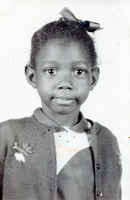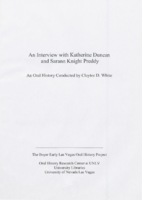Search the Special Collections and Archives Portal
Search Results

Photograph of Dell Ray Rhodes as a young girl
Date
Archival Collection
Description
Dell Ray Rhodes' kindergarten picture.
Image

Transcript of interview with Jerry Engel by Barbara Tabach, March 1, 2016
Date
Archival Collection
Description
Jerry Engel was born in 1930 in New Jersey and spent most of his early life in Long Beach, New York until the family moved westward to Las Angeles. Jerry is a retired Certified Public Accountant and loves to talk about the history of Las Vegas that he observed since arriving in 1953. That was the year that he moved to Las Vegas to join his older brothers, Morris and Phil, in their accounting firm. Their major client at the time was Desert Inn. Another personal connection with local history: the Engel brothers? mother, Esther Katz Engel, was among the early investors in the Moulin Rouge hotel/casino enterprise. Jerry graduated with honors from University of California, Los Angeles in 1951. His accounting career in Las Vegas is highly regarded and he continues to maintain a consulting practice. He remains active within the community and enjoys doing presentations based on his memories of Las Vegas history. Within this interview, Jerry highlights people, casinos and other observations of local history that he came into contact with over the decades. He provides insights about the role of an accountant in the gaming industry. He also discusses the influence of Jewish business leaders in and array of local gaming and non-gaming issues, including the retail world, Jim Crow era segregation, and the astonishing growth of the valley over six decades.
Text
Transcript of interview with Count Guido Roberto Deiro by David G. Schwartz, January 30, 2002
Date
Archival Collection
Description
Count Guido Roberto Deiro, born in Reno, Nevada, in 1938, has had several fascinating careers. The son of vaudeville performer and recording star Count Guido Pietro Deiro, who was the first major piano-accordionist to become popular in the United States, and his teenage wife Yvonne Teresa LeBaron De Forrest, Deiro grew up in and around Las Vegas and Southern California after his parents' 1941 divorce. After attending 13 grammar schools and five high schools, Deiro graduated from Las Vegas High School in 1955. During his youth, thanks to his stepfather Samuel "Baby Shoes" Prezant, Deiro had an early introduction to the Las Vegas gambling scene. Following a brief stint in the U.S. Army, Deiro worked a series of jobs, including parking cars, selling shoes, and driving an ambulance. He transitioned from working as a fitness instructor to being a lifeguard at the El Rancho Vegas hotel, all the while becoming interested in aviation. Deiro entered the gaming industry at the age of 19 and a half, when he began working as a dealer, having been taught by his stepfather. Breaking in at the Nevada Club, Deiro, who became known as "Bobby Blue Eyes," later worked at the New Frontier, Sands, El Cortez, and Holiday casinos. He provides a great deal of detail about the social world of Las Vegas casinos in the 1950s through the 1970s, with insight into many major personalities. While working in gaming, Deiro continued to pursue a career in aviation, acquiring in the early 1960s a commercial pilot license, instrument rating and instructor's certificate. He began working as a flight instructor and charter pilot at Thunderbird Field, now known as North Las Vegas Air Terminal. Deiro flew around the United States promoting Las Vegas and the airfield. After Howard Hughes purchased the airfield in 1967, Deiro stayed, ultimately becoming Director of Aviation Facilities for the Hughes Tool Company. Following his marriage to Joan Marlene Calhoun, Deiro moved to California, where he became Vice President and Director of Administration for Air California and Golden West Airlines, before serving with other companies owned by C. Arnholdt Smith. In 1971, Deiro returned to Las Vegas. Deiro then met artist Michael Heizer, who enlisted Deiro's help in scouting and securing locations for his Earth art installations. This led to Deiro's long involvement with that genre. In addition to these careers, Deiro was also influential in many key developments in Las Vegas, including the construction of the Las Vegas Motor Speedway and, with his wife Joan, several philanthropic endeavors. In this interview, Deiro shares his perspectives on his times and his impact on Las Vegas.
Text
Native American government reform: Kickingbird, Kirke, "The Powers of Tribal Government and the Role of Tribal Governments in Economic Development" report; Wright, Beverly M., and Shelley E. Carter, "A Barrier to Successful Reform: Apathy Within the Tribal Government of the Wampanoag Tribe of Gay Head/Aquinnah" report; Office of Navajo Government Development Staff, "Engaging the People of the Navajo Nation in the Process of Nation Building" report; excerpts from a symposium on constitutional reform and economic development; and newspaper article, 1985, 2001
Level of Description
Archival Collection
Collection Name: Katherine A. Spilde Papers on Native American Gaming
Box/Folder: Box 66
Archival Component
May, Rick L.
Rick May is a gay activist and mental health advocate in and around Las Vegas. He was born on May 30, 1952 in Amherst, Texas. His family owned a ranch in Sudan, Texas. After graduating, he moved around Texas for some years before moving to Las Vegas in 1982. He then became an active member of the LGBTQ+ community in Las Vegas, organizing many Pride events and eventually opening his own business, R and R Sundries.
Source:
Person
Review of Der Literaturbegriff: Geschichte, Komplemantärbegriffe, Intention. Eine Einführung, by Helmut Arntzen. A Journal of Germanic Studies Seminar. vol. 22, no. 4 (November 1986): 340-342, 1986
Level of Description
Archival Collection
Collection Name: University of Nevada, Las Vegas Faculty Publications
Box/Folder: Box 06
Archival Component
Audio recording clip of interview with Julie A. Payne by Claytee D. White, February 11, 2004 and March 7, 2004
Date
Archival Collection
Description
Part of an interview with Julie Payne by Claytee White on February 11, 2004. Payne describes programs that she worked on at Nevada Treatment Center.
Sound

Transcript of interview with Katherine Duncan and Sarann Knight Preddy by Claytee D. White, November 28, 2004
Date
Archival Collection
Description
Interview with Katherine Duncan and Sarann Knight Preddy conducted by Claytee D. White on November 28, 2004. Duncan moved to Las Vegas in 1977, worked with Nevada Motion Picture Services, and owned a travel agency. She started a black heritage tour of Las Vegas.
Text
Audio clip from interview with Eugene Williams conducted by Claytee D. White, July 17, 2008
Date
Archival Collection
Description
Audio clip from interview with Eugene Williams. In the clip, he recalls the prejudices that he and other black musicians faced during the 1970s.
Sound

Transcript of interview with Ronald Bananto by Eric Henninger, March 15, 1981
Date
Archival Collection
Description
Text
